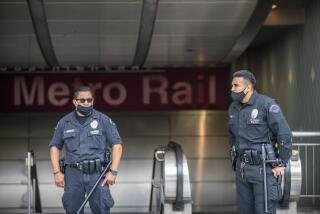Plan to Scrap Transit Police Force Gains
- Share via
With opposition collapsing, a long-stalled plan to abolish the county transit agency’s police force and merge its more than 350 officers into the area’s two largest law enforcement departments appears to be moving quickly toward reality, officials said Tuesday.
Under a plan spearheaded by Mayor Richard Riordan, the Los Angeles Police Department and the Los Angeles County Sheriff’s Department would assume joint control over protecting the county’s bus and rail lines. But the Metropolitan Transportation Authority, the beleaguered agency that now runs its own police department, would still finance the $42-million-a-year operation.
The move, marking another attempt by Riordan to consolidate his power at the MTA, would bring the mayor a step closer toward meeting his campaign pledge to enlarge the ranks of the LAPD. And it would satisfy long-simmering complaints from transit police, who maintain they could better serve the public--and elevate their own benefits and status--through the consolidation.
But those with reservations fear that by abolishing what has grown into the 10th-biggest police department in the state, the MTA would lose its ability to decide how officers should best be deployed in local transit operations.
“I think it stinks,” said MTA board member James Cragin, who believes the merger has become all but certain, despite concerns that transit security would suffer. “We’ll no longer have control over the MTA police, yet we have to pay for it. The mayor gets what he wants, the LAPD and the Sheriff’s Department get what they want, and the taxpayer gets the shaft.”
The MTA board will vote today on whether to set up an exploratory committee to study the merger issue. That is only a first step in the process, but some officials involved in the plan believe that Riordan has already garnered the support needed for its eventual passage.
Indeed, MTA Chairman Larry Zarian, who had initially opposed the merger, said he recently stopped trying to lobby against the plan after a discouraging conversation with an MTA police union representative.
The union official told him that no matter what concessions the MTA might offer in pension, benefits and other key issues, the union would still push to join with the LAPD and the Sheriff’s Department in order to feel that they were their “equals,” Zarian recounted. “That’s when I realized that all the work I’ve been doing on this the last four or five months was worthless. . . . I gave up,” the chairman said.
The conversation was only the final blow for Zarian.
The idea of a merger has been stymied for years amid competing political interests, but several events have come together in recent months to give it newfound momentum: State legislation that would have expanded the MTA officers’ death benefits was defeated, 85% of the MTA police union members voted in support of the merger and, perhaps most critically, MTA chief executive Frankin E. White--who had voiced concerns about the idea--was forced out after a months-long push by Riordan and his allies.
In an interview, Riordan said he will withhold final support until he sees details on how the plan would be enacted.
“It’s got to deliver at least as good protection or better at the same price or lower. . . . You could put more people out in the field by using a mixture of armed police and unarmed guards,” said Riordan, who visited New York City last year to see how that city had merged its transit and housing police into the city Police Department.
Riordan said it will probably be a couple of months before any merger is given final approval. “I’m optimistic that it will happen, but I can’t guarantee it.”
A joint proposal prepared by the LAPD and the Sheriff’s Department says it would cost virtually the same amount--$42.1 million a year--to protect local transit lines through the existing department or through a merged operation. But the proposal says the merger offers several long-term advantages as well, ending some duplication of efforts, improving coordination of services and enhancing the morale and status of the transit police.
Under the plans being discussed, the LAPD would get 60% of the MTA’s officers, now numbering more than 350, and the Sheriff’s Department would get 40%.
But the proposal acknowledges under “disadvantages” that there will be some start-up and transition costs, and LAPD Det. Gary Fullerton, a director of the Police Protective League, said there may be some initial tensions between transit officers and their new colleagues.
“There is some belief by a number of [LAPD] officers that the MTA officers . . . are ones that couldn’t get hired by LAPD or Sheriff’s. But they’re fully qualified officers, and any hesitation on the part of our officers would probably diminish pretty quickly,” he said.
More to Read
Sign up for Essential California
The most important California stories and recommendations in your inbox every morning.
You may occasionally receive promotional content from the Los Angeles Times.











